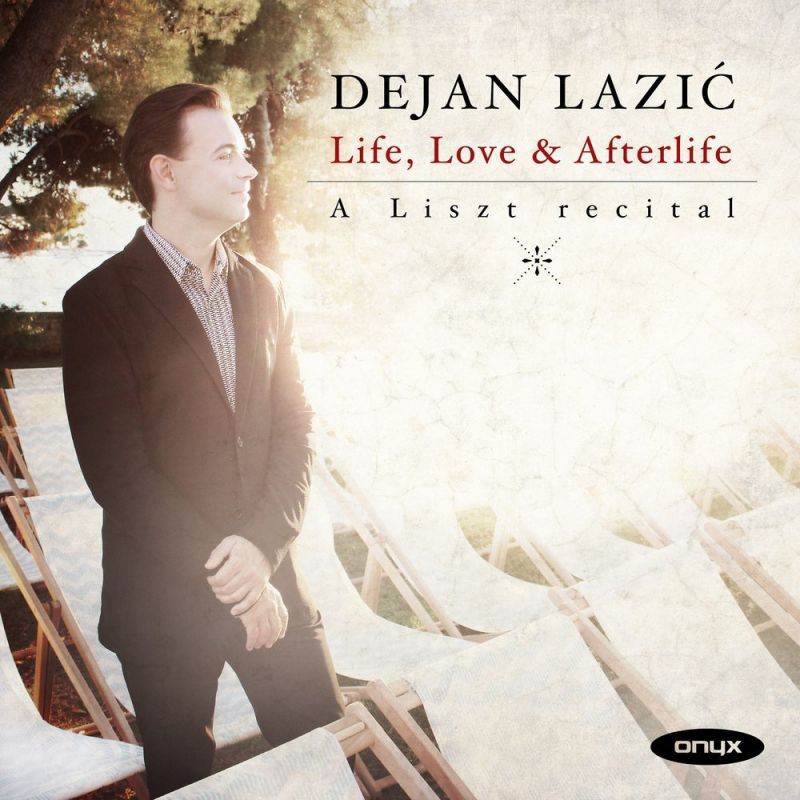LISZT Life, Love & Afterlife
View record and artist detailsRecord and Artist Details
Composer or Director: Franz Liszt
Genre:
Instrumental
Label: Onyx
Magazine Review Date: 07/2017
Media Format: CD or Download
Media Runtime: 78
Mastering:
DDD
Catalogue Number: ONYX4179

Tracks:
| Composition | Artist Credit |
|---|---|
| Requiem (Mozart) Two Pieces |
Franz Liszt, Composer
Dejan Lazic, Piano Franz Liszt, Composer |
| (2) Csárdás |
Franz Liszt, Composer
Dejan Lazic, Piano Franz Liszt, Composer |
| Erlkönig (Schubert) |
Franz Liszt, Composer
Dejan Lazic, Piano Franz Liszt, Composer |
| (19) Hungarian Rhapsodies, Movement: No. 18 in C sharp minor |
Franz Liszt, Composer
Dejan Lazic, Piano Franz Liszt, Composer |
| Tristan und Isolde (Wagner)–Liebestod |
Franz Liszt, Composer
Dejan Lazic, Piano Franz Liszt, Composer |
| Années de pèlerinage année 3, Movement: Les jeux d'eau à la Villa d'Este |
Franz Liszt, Composer
Dejan Lazic, Piano Franz Liszt, Composer |
| (3) Liebesträume, Movement: No. 3 in A flat, O lieb, so lang du lieben kannst |
Franz Liszt, Composer
Dejan Lazic, Piano Franz Liszt, Composer |
| Rigoletto (Verdi) Paraphrase |
Franz Liszt, Composer
Dejan Lazic, Piano Franz Liszt, Composer |
| Rienzi (Wagner) Fantasy |
Franz Liszt, Composer
Dejan Lazic, Piano Franz Liszt, Composer |
| Soirées de Vienne: 9 Valses caprices d'après Schubert, Movement: No. 6 in A minor (first edition) |
Franz Liszt, Composer
Dejan Lazic, Piano Franz Liszt, Composer |
| Venezia e Napoli (rev version) |
Franz Liszt, Composer
Dejan Lazic, undefined Franz Liszt, Composer |
Author: Patrick Rucker
Lazic´ maintains a languorous pulse in the 18th Rhapsody’s lassan, allowing tonal ambiguity to establish an ominous atmosphere. Glittering passages introduce the friss with what could almost be heat lightning playing around the horizon of a dark and louring sky. Both Csárdás are crisp and appropriately driven, with the Csárdás obstinée in particular calling to mind the contemporaneous Hungarian Historical Portraits.
A sparsely pedalled ‘Jeux d’eaux à la Villa d’Este’ from the Third Année creates a curiously secco effect, more pointillist than Impressionist. The explicitly spiritual dimension of the score, Liszt’s evocation of ‘the well of water springing up into everlasting life’ from St John, is left to the imagination.
In the Rigoletto Paraphrase we hear the first hints of Lazic´’s tendency toward an unbridled, capricious tempo rubato. Rather than fulfilling its presumed purpose of enhancing musical spontaneity, Lazic´ pushes this arbitrary leggiero rubato beyond the bounds of eccentricity and into the realm of rhythmic distortion. The music’s rhetorical underpinning starts to topple. It is puzzling because Lazic´ obviously takes great care to reproduce appropriate scansion of the verses of Goethe in ‘Erlkönig’ or of Freiligrath in the third Liebestraum. However, the rough-shod treatment given ‘Bella figlia dell’amore’, perhaps the best-known quartet in all Italian opera, leaves one wondering if Lazic´ has ever heard Rigoletto.
Whether due to whim or habit, this arbitrary rubato isn’t limited to transcriptions of music originally sung but spills into evocations of the dance as well. The dancers suggested in the sixth Soirée de Vienne, replete with coy changes of register, seem to have recognised their quixotic excesses and, by the last waltz iteration, are on their knees in a nearby church whispering a hymn for forgiveness. In Venezia e Napoli, following a rhythmically coherent and persuasive ‘Gondoliera’ and a sternly atmospheric ‘Canzone’, Lazic´ launches into the ‘Tarantella’ at a speed so furious that breathing pauses seem like accidental gashes in an overall textural blur. A sense of abandon, if that was intended, becomes so much insensate note-spinning. The only antidote for this exhausting traversal is instant immersion in the shimmering beauties of the Venezia e Napoli performances by Bertrand Chamayou or Louis Lortie.
The frustration in all this is that Lazic´ is such an immensely gifted player, with a subtlety of touch and vast resources of colouristic nuance that must be the envy of his colleagues. Their fullest realisation, however, precludes exploration of those antiquated paths of willful mannerism that, ultimately, can only lead to vulgarity.
Discover the world's largest classical music catalogue with Presto Music.

Gramophone Digital Club
- Digital Edition
- Digital Archive
- Reviews Database
- Full website access
From £8.75 / month
Subscribe
Gramophone Full Club
- Print Edition
- Digital Edition
- Digital Archive
- Reviews Database
- Full website access
From £11.00 / month
Subscribe
If you are a library, university or other organisation that would be interested in an institutional subscription to Gramophone please click here for further information.




